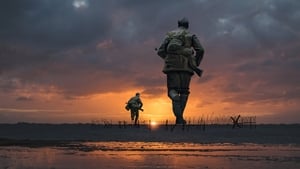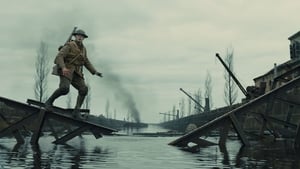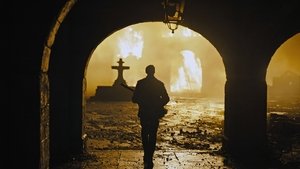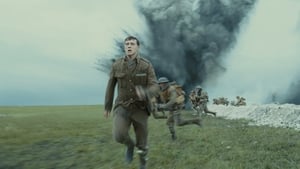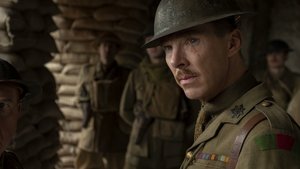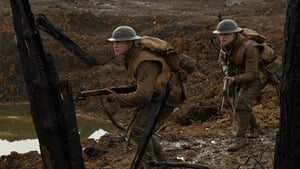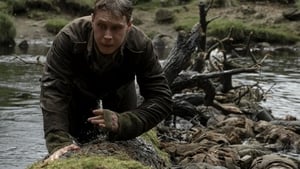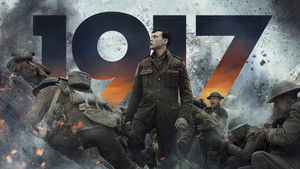Family stories have a way of resonating with us. They act as vessels into another world that we’re able to know and experience through the scope of our ancestors. And their impact can be profound, just ask Academy Award Winning filmmaker Sam Mendes (American Beauty and Skyfall) whose latest work is inspired from the World War I tales told to him by his late grandfather when he was just a boy. Those stories have stuck with Mendes for decades and, by using his unique visual mastery, have thrust the war epic 1917 into the heart of the Best Picture race.
When Lance Corporal Blake (Game of Throne’s Dean-Charles Chapman) and Lance Corporal Schofield (Captain Fantastic’s George MacKay) are summoned by a superior officer in the midst of the First World War, they could never have imagined the assignment placed in their hands. General Erinmore (Colin Firth) informs the men that an attack is planned for dusk, but they have just received word that it’s a trap by the Germans and more than 1,600 men are preparing to be slaughtered, one of which is Blake’s older brother. In a race against time that requires the soldiers to journey deep into enemy territory along the most direct route to their fellow officers, Blake and Schofield encounter the crushing brutalities of war at every turn, with hopes of surviving this dangerous mission and delivering the General’s orders to stop the attack before dawn arrives.
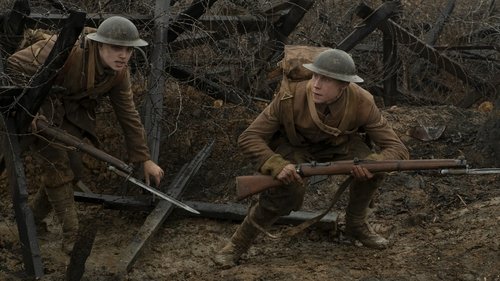
Sam Mendes’ 1917 is a completely immersive experience that takes audiences to the front lines of battle and into the trenches of one the most gruesome wars in the history of the world. Filmed in such a way that it appears to be one single shot where the camera never leaves these two men, Mendes has most certainly cemented himself and his film in the Best Director and Best Picture races. 1917 oozes with technical mastery and checks nearly all the boxes for Oscar voters. And while I too loved the riveting perspective of the film, I was far less impressed by Mendes’ script. The story becomes hamstrung by the decision of this stylistic approach which disallows an expansive use of subplots and secondary characters. Forcing us to travel beside these men essentially makes the majority of the story simply about their experiences. This can be mesmerizing at times and certainly helps with the film’s pacing, but it also leaves more to be desired in terms of developed and arcing story. I wonder if 1917 would have been better served by including a handful of massively long takes to generate a similar feel but still made traditional cuts to help broaden the story and characters. Either way, we can’t refute the overall impact and technical greatness behind another superb effort from an often-overlooked filmmaker.
-
 NameGeorge MacKayCharacterLance Corporal Schofield
NameGeorge MacKayCharacterLance Corporal Schofield -
 NameDean-Charles ChapmanCharacterLance Corporal Blake
NameDean-Charles ChapmanCharacterLance Corporal Blake -
 NameMark StrongCharacterCaptain Smith
NameMark StrongCharacterCaptain Smith -
 NameAndrew ScottCharacterLieutenant Leslie
NameAndrew ScottCharacterLieutenant Leslie -
 NameRichard MaddenCharacterLieutenant Blake
NameRichard MaddenCharacterLieutenant Blake -
 NameClaire DuburcqCharacterLauri
NameClaire DuburcqCharacterLauri -
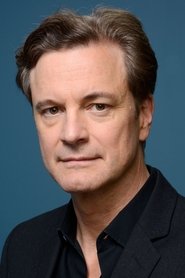 NameColin FirthCharacterGeneral Erinmore
NameColin FirthCharacterGeneral Erinmore -
 NameBenedict CumberbatchCharacterColonel MacKenzie
NameBenedict CumberbatchCharacterColonel MacKenzie -
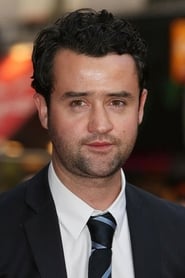 NameDaniel MaysCharacterSergeant Sanders
NameDaniel MaysCharacterSergeant Sanders -
 NameAdrian ScarboroughCharacterMajor Hepburn
NameAdrian ScarboroughCharacterMajor Hepburn -
 NameChris WalleyCharacterPrivate Bullen
NameChris WalleyCharacterPrivate Bullen -
 NameNabhaan RizwanCharacterSepoy Jondalar
NameNabhaan RizwanCharacterSepoy Jondalar -
 NameJamie ParkerCharacterLieutenant Richards
NameJamie ParkerCharacterLieutenant Richards -
 NameTommy FrenchCharacterPrivate Butler
NameTommy FrenchCharacterPrivate Butler -
 NamePaul TintoCharacterNCO Baker
NamePaul TintoCharacterNCO Baker -
 NameBilly PostlethwaiteCharacterNCO Harvey
NameBilly PostlethwaiteCharacterNCO Harvey -
 NameRichard McCabeCharacterColonel Collins
NameRichard McCabeCharacterColonel Collins -
 NameJustin EdwardsCharacterCaptain Ivins
NameJustin EdwardsCharacterCaptain Ivins -
 NamePip CarterCharacterLieutenant Gordon
NamePip CarterCharacterLieutenant Gordon -
 NameAndy ApolloCharacterSergeant Miller
NameAndy ApolloCharacterSergeant Miller -
 NameJosef DaviesCharacterPrivate Stokes
NameJosef DaviesCharacterPrivate Stokes -
 NameGabriel AkuwudikeCharacterPrivate Buchanan
NameGabriel AkuwudikeCharacterPrivate Buchanan -
 NameSpike LeightonCharacterPrivate Kilgour
NameSpike LeightonCharacterPrivate Kilgour -
 NameRobert MaaserCharacterGerman Pilot
NameRobert MaaserCharacterGerman Pilot -
 NameGerran HowellCharacterPrivate Parry
NameGerran HowellCharacterPrivate Parry -
 NameAdam HugillCharacterPrivate Atkins
NameAdam HugillCharacterPrivate Atkins -
 NameBenjamin AdamsCharacterSergeant Harrop
NameBenjamin AdamsCharacterSergeant Harrop -
 NameAnson BoonCharacterPrivate Cooke
NameAnson BoonCharacterPrivate Cooke -
 NameKenny FullwoodCharacterPrivate Rossi
NameKenny FullwoodCharacterPrivate Rossi -
 NameRyan NolanCharacterPrivate Malky
NameRyan NolanCharacterPrivate Malky -
 NameElliot BaxterCharacterPrivate Sniper
NameElliot BaxterCharacterPrivate Sniper -
 NameKye MckeeCharacterGerman Soldier
NameKye MckeeCharacterGerman Soldier -
 NameIvy-I MacnamaraCharacterFrench Baby
NameIvy-I MacnamaraCharacterFrench Baby -
 NameMerlin LeonhardtCharacterSoldat Muller
NameMerlin LeonhardtCharacterSoldat Muller -
 NameTaddeo KufusCharacterSoldat Baumer
NameTaddeo KufusCharacterSoldat Baumer -
 NameJos SlovickCharacterWayfaring Stranger Soldier
NameJos SlovickCharacterWayfaring Stranger Soldier -
 NameLuke HornsbyCharacterPrivate Pinwood
NameLuke HornsbyCharacterPrivate Pinwood -
 NameJack ShallooCharacterPrivate Seymour
NameJack ShallooCharacterPrivate Seymour -
 NameElliot EdusahCharacterPrivate Grey
NameElliot EdusahCharacterPrivate Grey -
 NameJacob James BeswickCharacterLance Corporal Duff
NameJacob James BeswickCharacterLance Corporal Duff -
 NameMichael JibsonCharacterLieutenant Hutton
NameMichael JibsonCharacterLieutenant Hutton -
 NameIan WilsonCharacterSergeant Wright
NameIan WilsonCharacterSergeant Wright -
 NameBradley ConnorCharacterSergeant Gardner
NameBradley ConnorCharacterSergeant Gardner -
 NameJohn HollingworthCharacterSergeant Guthrie
NameJohn HollingworthCharacterSergeant Guthrie -
 NameMichael SmithCharacterOrderly Dixon
NameMichael SmithCharacterOrderly Dixon -
 NameJonny LavelleCharacterOrderly Byrne
NameJonny LavelleCharacterOrderly Byrne -
 NameMichael RouseCharacterCaptain Rylands
NameMichael RouseCharacterCaptain Rylands -
 NameRichard DempseyCharacterMackenzie Officer
NameRichard DempseyCharacterMackenzie Officer -
 NamePhil CheadleCharacterMackenzie Officer
NamePhil CheadleCharacterMackenzie Officer -
 NameJonah RussellCharacterCaptain Morahan
NameJonah RussellCharacterCaptain Morahan -
 NameDaniel AttwellCharacterCaptain Sandbach
NameDaniel AttwellCharacterCaptain Sandbach -
 NameJoe AndersCharacterPrivate Willock (as Joe Mendes)
NameJoe AndersCharacterPrivate Willock (as Joe Mendes) -
 NameBogdan KumšackijCharacterGerman Sniper
NameBogdan KumšackijCharacterGerman Sniper -
 NameOliver SimmsCharacterAttacking Soldier (uncredited)
NameOliver SimmsCharacterAttacking Soldier (uncredited)
-
 NameSam MendesJobDirector
NameSam MendesJobDirector -
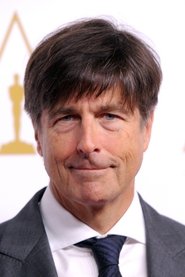 NameThomas NewmanJobOriginal Music Composer
NameThomas NewmanJobOriginal Music Composer -
 NameKrysty Wilson-CairnsJobWriter
NameKrysty Wilson-CairnsJobWriter -
 NameSam MendesJobWriter
NameSam MendesJobWriter -
 NameJohn HigginsJobGaffer
NameJohn HigginsJobGaffer -
 NameJane KarenJobDialect Coach
NameJane KarenJobDialect Coach -
 NameJames StarrJobRigging Grip
NameJames StarrJobRigging Grip -
 NameReetu AggarwalJob3D Artist
NameReetu AggarwalJob3D Artist -
 NamePaul BiddissJobMilitary Consultant
NamePaul BiddissJobMilitary Consultant -
 NameRachael TateJobADR Supervisor
NameRachael TateJobADR Supervisor -
 NameHannah GodwinJobUnit Production Manager
NameHannah GodwinJobUnit Production Manager -
 NameThomas FennellJobFirst Assistant Sound Editor
NameThomas FennellJobFirst Assistant Sound Editor -
 NameJoey CoughlinJobSecond Assistant Director
NameJoey CoughlinJobSecond Assistant Director -
 NameJames HarrisonJobSound Effects Designer
NameJames HarrisonJobSound Effects Designer -
 NameMark ApplebyJobADR Mixer
NameMark ApplebyJobADR Mixer -
 NameAdam MendezJobFoley Mixer
NameAdam MendezJobFoley Mixer -
 NamePeter ClarkeJobMusic Editor
NamePeter ClarkeJobMusic Editor -
 NameMichael FentumJobSound Designer
NameMichael FentumJobSound Designer -
 NameMaria KellyJobADR Recordist
NameMaria KellyJobADR Recordist -
 NameCallum McDougallJobUnit Production Manager
NameCallum McDougallJobUnit Production Manager -
 NameAndrea KingJobFoley Artist
NameAndrea KingJobFoley Artist -
 NameJ.A.C. RedfordJobOrchestrator
NameJ.A.C. RedfordJobOrchestrator -
 NameHugh SherlockJobFirst Assistant Sound Editor
NameHugh SherlockJobFirst Assistant Sound Editor -
 NameAran CliffordJobAssistant Sound Editor
NameAran CliffordJobAssistant Sound Editor -
 NameHugo AdamsJobFoley Supervisor
NameHugo AdamsJobFoley Supervisor -
 NameSue HardingJobFoley Artist
NameSue HardingJobFoley Artist -
 NameDavid CrossmanJobCostume Design
NameDavid CrossmanJobCostume Design -
 NameJames Ellis DeakinsJobProduction Consultant
NameJames Ellis DeakinsJobProduction Consultant -
 NameKimberly PopeJobConceptual Illustrator
NameKimberly PopeJobConceptual Illustrator -
 NameLauren CamilleriJobVFX Editor
NameLauren CamilleriJobVFX Editor -
 NameNoami BourgeoisJobVFX Editor
NameNoami BourgeoisJobVFX Editor -
 NameBarbara LaviaJobVFX Editor
NameBarbara LaviaJobVFX Editor -
 NameJames MannJobVFX Editor
NameJames MannJobVFX Editor -
 NameJayne-Ann TenggrenJobProducer
NameJayne-Ann TenggrenJobProducer -
 NamePippa HarrisJobProducer
NamePippa HarrisJobProducer -
 NameMichael LermanJobProducer
NameMichael LermanJobProducer -
 NameSam MendesJobProducer
NameSam MendesJobProducer -
 NameCallum McDougallJobProducer
NameCallum McDougallJobProducer -
 NameLee SmithJobEditor
NameLee SmithJobEditor -
 NameRod McLeanJobArt Direction
NameRod McLeanJobArt Direction -
 NameSimon ElsleyJobArt Direction
NameSimon ElsleyJobArt Direction -
 NameElaine KusmishkoJobArt Direction
NameElaine KusmishkoJobArt Direction -
 NameJacqueline DurranJobCostume Design
NameJacqueline DurranJobCostume Design -
 NameStephen SwainJobArt Direction
NameStephen SwainJobArt Direction -
 NameDennis GassnerJobProduction Design
NameDennis GassnerJobProduction Design -
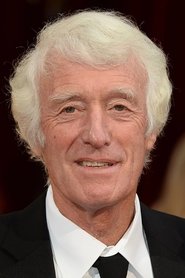 NameRoger DeakinsJobDirector of Photography
NameRoger DeakinsJobDirector of Photography -
 NameDominic TuohyJobSpecial Effects Supervisor
NameDominic TuohyJobSpecial Effects Supervisor -
 NameGreg ButlerJobVisual Effects Supervisor
NameGreg ButlerJobVisual Effects Supervisor -
 NameLee SandalesJobSet Decoration
NameLee SandalesJobSet Decoration -
 NameGuillaume RocheronJobVisual Effects Supervisor
NameGuillaume RocheronJobVisual Effects Supervisor -
 NameRachael TateJobDialogue Editor
NameRachael TateJobDialogue Editor -
 NameScott MillanJobSound Re-Recording Mixer
NameScott MillanJobSound Re-Recording Mixer -
 NameMark TaylorJobSound Re-Recording Mixer
NameMark TaylorJobSound Re-Recording Mixer -
 NameOliver TarneyJobSupervising Sound Editor
NameOliver TarneyJobSupervising Sound Editor -
 NameStuart WilsonJobProduction Sound Mixer
NameStuart WilsonJobProduction Sound Mixer -
 NameTristan VersluisJobProsthetic Designer
NameTristan VersluisJobProsthetic Designer -
 NameOndrej HudecekJob3D Artist
NameOndrej HudecekJob3D Artist -
 NameMidhun SajeevalalJobLighting Artist
NameMidhun SajeevalalJobLighting Artist -
 NameMarc RiceJobCompositing Supervisor
NameMarc RiceJobCompositing Supervisor -
 NamePrashant NairJobCompositing Lead
NamePrashant NairJobCompositing Lead -
 NameAnshad AbuJobLighting Artist
NameAnshad AbuJobLighting Artist -
 NameAyyappadas VijayakumarJobVFX Editor
NameAyyappadas VijayakumarJobVFX Editor -
 NameSageesh KvJobLighting Artist
NameSageesh KvJobLighting Artist -
 NameArtem SukachJobCompositing Lead
NameArtem SukachJobCompositing Lead -
 NameKush DhirJobCompositing Lead
NameKush DhirJobCompositing Lead -
 NameChristopher ReiterJobLighting Artist
NameChristopher ReiterJobLighting Artist -
 NameSreejith VenugopalanJobCompositing Supervisor
NameSreejith VenugopalanJobCompositing Supervisor -
 NameSuraj MakhijaJobLighting Artist
NameSuraj MakhijaJobLighting Artist -
 NameAndrew TullochJobPre-Visualization Supervisor
NameAndrew TullochJobPre-Visualization Supervisor -
 NameTrushna PatelJobVFX Editor
NameTrushna PatelJobVFX Editor -
 NameRahul k KhannaJobVisual Effects Coordinator
NameRahul k KhannaJobVisual Effects Coordinator -
 NameAmi YamauchiJobVisual Effects Producer
NameAmi YamauchiJobVisual Effects Producer -
 NameAnge Labbé-DuludeJobVisual Effects Production Assistant
NameAnge Labbé-DuludeJobVisual Effects Production Assistant -
 NameRichard LittleJobVisual Effects Supervisor
NameRichard LittleJobVisual Effects Supervisor -
 NameAli PakJobVisual Effects Coordinator
NameAli PakJobVisual Effects Coordinator -
 NameWill NewisJobVisual Effects Producer
NameWill NewisJobVisual Effects Producer -
 NameSona PakJobVisual Effects Producer
NameSona PakJobVisual Effects Producer -
 NameNick SargentJobVisual Effects Supervisor
NameNick SargentJobVisual Effects Supervisor -
 NameLucas CaldasJobVFX Production Coordinator
NameLucas CaldasJobVFX Production Coordinator -
 NameTeresa MathewJobVisual Effects Coordinator
NameTeresa MathewJobVisual Effects Coordinator -
 NamePier LefebvreJobVisual Effects Supervisor
NamePier LefebvreJobVisual Effects Supervisor -
 NameSteve DitchburnJobVisual Effects Coordinator
NameSteve DitchburnJobVisual Effects Coordinator -
 NameOliver TaylorJobVisual Effects Coordinator
NameOliver TaylorJobVisual Effects Coordinator -
 NameTim Pounds-CornishJobVisual Effects Production Manager
NameTim Pounds-CornishJobVisual Effects Production Manager -
 NameAjay RoshanJobVisual Effects Coordinator
NameAjay RoshanJobVisual Effects Coordinator -
 NameNunzia LombardoJobVisual Effects Production Assistant
NameNunzia LombardoJobVisual Effects Production Assistant -
 NameRahul KhannaJobVisual Effects Coordinator
NameRahul KhannaJobVisual Effects Coordinator -
 NameHuong VuJobVisual Effects Coordinator
NameHuong VuJobVisual Effects Coordinator -
 NameBrenda MckernanJobContact Lens Technician
NameBrenda MckernanJobContact Lens Technician -
 NameCristina PattersonJobContact Lens Designer
NameCristina PattersonJobContact Lens Designer -
 NameNorma WebbJobKey Makeup Artist
NameNorma WebbJobKey Makeup Artist -
 NameDoone ForsythJobMakeup & Hair
NameDoone ForsythJobMakeup & Hair -
 NameDean SouthanJobCamera Trainee
NameDean SouthanJobCamera Trainee -
 NameJános JackJobDigital Imaging Technician
NameJános JackJobDigital Imaging Technician -
 NamePeter AyrissJobDrone Pilot
NamePeter AyrissJobDrone Pilot -
 NameNeil AshtonJobElectrician
NameNeil AshtonJobElectrician -
 NameAlice HollingumJobMakeup Artist
NameAlice HollingumJobMakeup Artist -
 NameJoshua GollishJobDigital Imaging Technician
NameJoshua GollishJobDigital Imaging Technician -
 NameEd StoneJobDrone Operator
NameEd StoneJobDrone Operator -
 NameMariona TríasJobMakeup & Hair
NameMariona TríasJobMakeup & Hair -
 NameAndrew WhiteoakJobMakeup & Hair
NameAndrew WhiteoakJobMakeup & Hair -
 NameMary CookeJobMakeup & Hair
NameMary CookeJobMakeup & Hair -
 NamePeter TalbotJobVFX Director of Photography
NamePeter TalbotJobVFX Director of Photography -
 NameAlex HarperJobProsthetic Makeup Artist
NameAlex HarperJobProsthetic Makeup Artist -
 NameSylvia AtkinsJobMakeup & Hair
NameSylvia AtkinsJobMakeup & Hair -
 NameGrace McComiskyJobProsthetic Makeup Artist
NameGrace McComiskyJobProsthetic Makeup Artist -
 NameAnna LubbockJobMakeup & Hair
NameAnna LubbockJobMakeup & Hair -
 NameIain ThomsonJobDigital Imaging Technician
NameIain ThomsonJobDigital Imaging Technician -
 NameSarah Jane MarksJobMakeup Artist
NameSarah Jane MarksJobMakeup Artist -
 NameDaniel McGrawJobMakeup Artist
NameDaniel McGrawJobMakeup Artist -
 NameSara KramerJobMakeup & Hair
NameSara KramerJobMakeup & Hair -
 NameGary SmithJobBest Boy Grip
NameGary SmithJobBest Boy Grip -
 NameNaomi DonneJobMakeup Designer
NameNaomi DonneJobMakeup Designer -
 NameMarzenna Fus-MickiewiczJobMakeup Artist
NameMarzenna Fus-MickiewiczJobMakeup Artist -
 NameNiki De JongJobProsthetic Makeup Artist
NameNiki De JongJobProsthetic Makeup Artist -
 NameJohn MarzanoJobAerial Director of Photography
NameJohn MarzanoJobAerial Director of Photography -
 NameRoger DeakinsJobCamera Operator
NameRoger DeakinsJobCamera Operator -
 NameScott ClooneyJobElectrician
NameScott ClooneyJobElectrician -
 NameMatt LumleyJobElectrician
NameMatt LumleyJobElectrician -
 NameGary HymnsJobKey Grip
NameGary HymnsJobKey Grip -
 NameTerry RobbJobElectrician
NameTerry RobbJobElectrician -
 NameGreg WhitbrookJobElectrician
NameGreg WhitbrookJobElectrician -
 NameBradley DennisJobEpk Camera Operator
NameBradley DennisJobEpk Camera Operator -
 NameSimon MuirJobRigging Grip
NameSimon MuirJobRigging Grip -
 NameDarren BaileyJobLibra Head Technician
NameDarren BaileyJobLibra Head Technician -
 NamePete CavaciutiJobSteadicam Operator
NamePete CavaciutiJobSteadicam Operator -
 NameTony HigginsJobElectrician
NameTony HigginsJobElectrician -
 NameFrançois DuhamelJobStill Photographer
NameFrançois DuhamelJobStill Photographer -
 NameMatt CurtisJobTitle Designer
NameMatt CurtisJobTitle Designer -
 NameMichael ChambersJobElectrician
NameMichael ChambersJobElectrician -
 NameWayne LeachJobRigging Gaffer
NameWayne LeachJobRigging Gaffer -
 NameDave MarriottJobElectrician
NameDave MarriottJobElectrician -
 NameAndrew HarrisJobFirst Assistant Camera
NameAndrew HarrisJobFirst Assistant Camera -
 NameColin HazellJobTechno Crane Operator
NameColin HazellJobTechno Crane Operator -
 NameGuido CavaciutiJobSecond Assistant Camera
NameGuido CavaciutiJobSecond Assistant Camera -
 NameDaren BaileyJobMarine Coordinator
NameDaren BaileyJobMarine Coordinator -
 NameRachel KennedyJobUnit Publicist
NameRachel KennedyJobUnit Publicist -
 NameTony SmithJobArmorer
NameTony SmithJobArmorer -
 NameMarcella SilveiraJobVFX Production Coordinator
NameMarcella SilveiraJobVFX Production Coordinator -
 NameJoss SkottoweJobSupervising Armorer
NameJoss SkottoweJobSupervising Armorer -
 NameMetusalem BjornssonJobProduction Coordinator
NameMetusalem BjornssonJobProduction Coordinator -
 NameAndy StephensJobAerial Coordinator
NameAndy StephensJobAerial Coordinator -
 NameCharles BodycombJobArmorer
NameCharles BodycombJobArmorer -
 NameEmma DunleavyJobProduction Coordinator
NameEmma DunleavyJobProduction Coordinator -
 NameMichael LermanJobFirst Assistant Director
NameMichael LermanJobFirst Assistant Director -
 NameSacha GarrettJobCasting Assistant
NameSacha GarrettJobCasting Assistant -
 NameNina GoldJobCasting
NameNina GoldJobCasting -
 NamePearce RoemerJobFirst Assistant Editor
NamePearce RoemerJobFirst Assistant Editor -
 NameJames SlatteryJobColorist
NameJames SlatteryJobColorist -
 NameJonas JangvadJobColor Assistant
NameJonas JangvadJobColor Assistant -
 NameChris FrancisJobColor Assistant
NameChris FrancisJobColor Assistant -
 NameBertie SpiegelbergJobProduction Supervisor
NameBertie SpiegelbergJobProduction Supervisor -
 NameMolly MacCormackJobColor Assistant
NameMolly MacCormackJobColor Assistant -
 NameVanessa BakerJobADR Voice Casting
NameVanessa BakerJobADR Voice Casting -
 NameLucy AmosJobCasting Assistant
NameLucy AmosJobCasting Assistant -
 NameJohn A. MaltbyJobDailies Operator
NameJohn A. MaltbyJobDailies Operator -
 NameMollie GamoJobCasting Associate
NameMollie GamoJobCasting Associate -
 NameNorman WalsheJobConcept Artist
NameNorman WalsheJobConcept Artist -
 NameAoife WarrenJobAssistant Art Director
NameAoife WarrenJobAssistant Art Director -
 NameNick AkassJobDressing Prop
NameNick AkassJobDressing Prop -
 NameDana AnuscaJobDraughtsman
NameDana AnuscaJobDraughtsman -
 NameRenato CavallaroJobDressing Prop
NameRenato CavallaroJobDressing Prop -
 NameBevan de KockJobGreensman
NameBevan de KockJobGreensman -
 NameMalcolm RobertsJobConstruction Manager
NameMalcolm RobertsJobConstruction Manager -
 NameAlison ClementsJobDraughtsman
NameAlison ClementsJobDraughtsman -
 NameNathan BaconJobGreensman
NameNathan BaconJobGreensman -
 NameLauren Briggs-MillerJobAssistant Art Director
NameLauren Briggs-MillerJobAssistant Art Director -
 NameAngus HaleJobGreensman
NameAngus HaleJobGreensman -
 NameSarah BicknellJobAssistant Art Director
NameSarah BicknellJobAssistant Art Director -
 NameLizzie OsborneJobDraughtsman
NameLizzie OsborneJobDraughtsman -
 NameEmine SoydanyavasJobArt Department Coordinator
NameEmine SoydanyavasJobArt Department Coordinator -
 NameOlivia WatkinsJobDraughtsman
NameOlivia WatkinsJobDraughtsman -
 NameSteve WestleyJobDressing Prop
NameSteve WestleyJobDressing Prop -
 NameTor RichardsJobGreensman
NameTor RichardsJobGreensman -
 NameAnthony NobleJobGraphic Designer
NameAnthony NobleJobGraphic Designer -
 NameDaniel GibsonJobGreensman
NameDaniel GibsonJobGreensman -
 NameDaniel ValentineJobDressing Prop
NameDaniel ValentineJobDressing Prop -
 NameDanny ClarkJobAssistant Art Director
NameDanny ClarkJobAssistant Art Director -
 NameRandolph WatsonJobConcept Artist
NameRandolph WatsonJobConcept Artist -
 NameRobert VoyseyJobConstruction Foreman
NameRobert VoyseyJobConstruction Foreman -
 NameWill SmithJobDraughtsman
NameWill SmithJobDraughtsman -
 NameJamie BurrowsJobDraughtsman
NameJamie BurrowsJobDraughtsman -
 NameXavier Swinton ByrneJobDressing Prop
NameXavier Swinton ByrneJobDressing Prop -
 NameNatasha JonesJobGraphic Designer
NameNatasha JonesJobGraphic Designer -
 NamePeter LeeJobProp Maker
NamePeter LeeJobProp Maker -
 NameRupert SteggleJobWardrobe Assistant
NameRupert SteggleJobWardrobe Assistant -
 NameMatt ChisholmJobProps
NameMatt ChisholmJobProps -
 NameLaura NgJobStandby Art Director
NameLaura NgJobStandby Art Director -
 NameBuddie WilkinsonJobProps
NameBuddie WilkinsonJobProps -
 NameJim CornishJobStoryboard Artist
NameJim CornishJobStoryboard Artist -
 NameNicola BeltonJobTextile Artist
NameNicola BeltonJobTextile Artist -
 NameKieron StoneJobWardrobe Assistant
NameKieron StoneJobWardrobe Assistant -
 NameTimeyin JonesJobProps
NameTimeyin JonesJobProps -
 NameJosh JonesJobStandby Carpenter
NameJosh JonesJobStandby Carpenter -
 NameSamantha ChoatJobCostume Assistant
NameSamantha ChoatJobCostume Assistant -
 NameNicoletta ManiJobScript Supervisor
NameNicoletta ManiJobScript Supervisor -
 NameLaura CollinsJobSet Dresser
NameLaura CollinsJobSet Dresser -
 NameHeidi McQueen-PrenticeJobCostume Assistant
NameHeidi McQueen-PrenticeJobCostume Assistant -
 NameWill AyresJobProps
NameWill AyresJobProps -
 NameNicholas Roche-GordonJobCostumer
NameNicholas Roche-GordonJobCostumer -
 NameJoel ChristopherJobCostumer
NameJoel ChristopherJobCostumer -
 NameCara StevensJobKey Costumer
NameCara StevensJobKey Costumer -
 NameJamie WilkinsonJobProperty Master
NameJamie WilkinsonJobProperty Master -
 NameLorna CookJobCostume Standby
NameLorna CookJobCostume Standby -
 NameSophie Le LievreJobSculptor
NameSophie Le LievreJobSculptor -
 NameRob MenzerJobSculptor
NameRob MenzerJobSculptor -
 NameAnthony TuffJobCostumer
NameAnthony TuffJobCostumer -
 NameHelen JeromeJobWardrobe Assistant
NameHelen JeromeJobWardrobe Assistant -
 NameNeil MurphyJobCostume Supervisor
NameNeil MurphyJobCostume Supervisor -
 NameStella AtkinsonJobAssistant Costume Designer
NameStella AtkinsonJobAssistant Costume Designer -
 NameWilliam EvansJobCostume Assistant
NameWilliam EvansJobCostume Assistant -
 NameAmanda TrewinJobCostume Assistant
NameAmanda TrewinJobCostume Assistant -
 NameEve WalkerJobCostume Coordinator
NameEve WalkerJobCostume Coordinator -
 NameElla ReidJobCostume Assistant
NameElla ReidJobCostume Assistant -
 NameSally JamesJobKey Costumer
NameSally JamesJobKey Costumer -
 NameIgnacio Salazar-SimpsonJobExecutive Producer
NameIgnacio Salazar-SimpsonJobExecutive Producer -
 NameRicardo Marco BudéJobExecutive Producer
NameRicardo Marco BudéJobExecutive Producer -
 NameOleg PetrovJobExecutive Producer
NameOleg PetrovJobExecutive Producer -
 NameJeb BrodyJobExecutive Producer
NameJeb BrodyJobExecutive Producer -
 NameDoren John FarmerJobStunts
NameDoren John FarmerJobStunts -
 NameLuke TumberJobStunts
NameLuke TumberJobStunts -
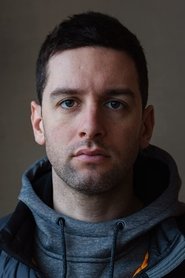 NameJosh DyerJobStunts
NameJosh DyerJobStunts -
 NameAndie DaviesJobVisual Effects
NameAndie DaviesJobVisual Effects -
 NameMatthew BellJobStunts
NameMatthew BellJobStunts -
 NameBen CookeJobStunt Coordinator
NameBen CookeJobStunt Coordinator -
 NameLuke ScottJobStunt Double
NameLuke ScottJobStunt Double -
 NameKyle FreemantleJobStunts
NameKyle FreemantleJobStunts -
 NamePierre KacicaJobSecurity
NamePierre KacicaJobSecurity -
 NameNicholas WhiteJobCrowd Assistant Director
NameNicholas WhiteJobCrowd Assistant Director -
 NameChris LyonsJobSpecial Effects Makeup Artist
NameChris LyonsJobSpecial Effects Makeup Artist -
 NameRebecca ColeJobKey Hair Stylist
NameRebecca ColeJobKey Hair Stylist -
 NameRebecca ColeJobKey Makeup Artist
NameRebecca ColeJobKey Makeup Artist
-
Trailer
-
Trailer
-
Trailer
-
Trailer
-
Trailer
-
Clip
-
Clip
-
Featurette
-
Featurette
-
Featurette
-
Featurette
-
Featurette
-
Featurette
-
Featurette
-
Featurette
-
Featurette
-
Featurette
-
Featurette
-
Featurette
-
Featurette
-
Featurette







